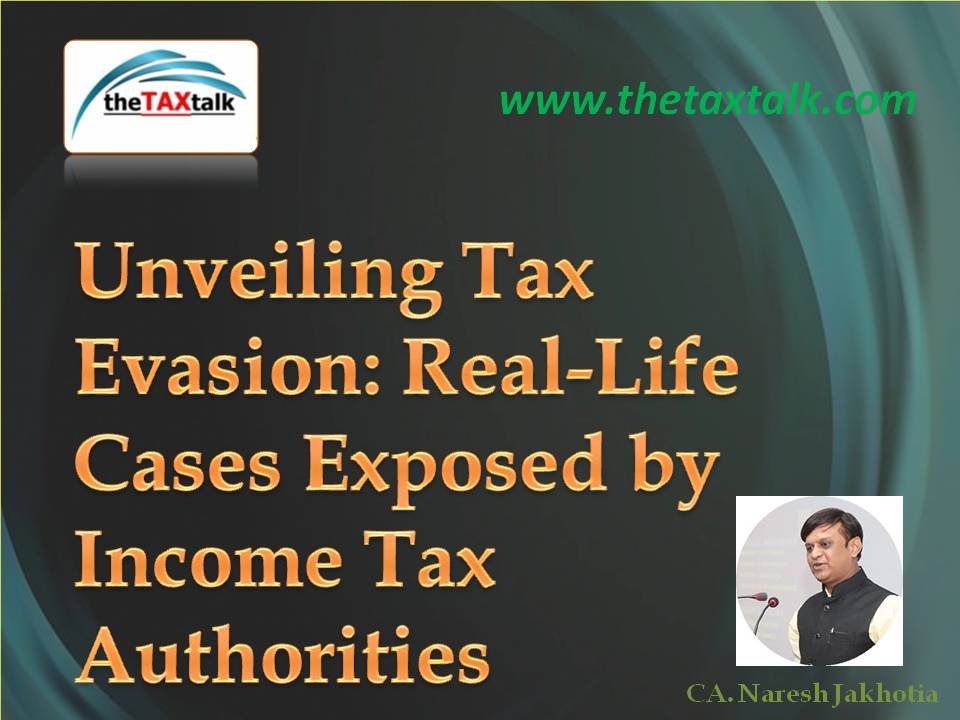![]()
Unveiling Tax Evasion: Real-Life Cases Exposed by Income Tax Authorities
Tax evasions are dealt strongly all over the world, India is not an exception. With more & more digitalization, the age-old strategy of hiding financial matters to evade taxes is becoming increasingly obsolete. Indian tax authorities are harnessing on technology to uncover hidden assets, unreported incomes, and deceptive financial maneuvers. With the advent of digitalization, every financial transaction leaves a traceable footprint, whether it’s an offshore bank account, a property sale, or even inflated expense claims. The days of evading taxes with the assumption of anonymity or geographic obscurity are unequivocally over. Here are few real-life cases of tax evasion / non-compliances detected by the income tax department which may make you think that “Ab sab nahi chalenga…”:
1. Mr. X has purchased agricultural land from Mr. Y for Rs. 2.50 Cr, executed the sale deed of Rs. 1 Cr on 17.05.2019. After the sale deed, Mr. X was happy that he had successfully parted with the black money of Rs. 1.50 Cr. Now, Mr. X has a notice in his hands from the income tax department asking why he should not be made liable for payment of income tax @78% plus interest on Rs. 1.50 Cr? How can this happen after a period of 5 years?
Source of Information: Mr. Y has deposited the cash of Rs. 30 Lakh in his & 4 other family members’ accounts. On enquiry, he appeared before the income tax officers and submitted the copy of the agreement to sale of Rs. 2.50 Cr signed earlier and officers recorded the same in a written statement before him. One may note that the income tax department has information regarding cash deposits in savings bank accounts of an amount exceeding Rs. 10 Lakh & has a power to inquire about such transactions up to a period of 10 years.
2. Miss Cute is working in an IT company at Bengaluru with an awesome salary package. To save tax & get more income tax refund, she submitted some inflated rent receipts to the employer and when the employer asked for the PAN of the landlord, she dutifully submitted that too, albeit a fake one. She was happy to receive the income tax refund of a higher amount. Now, the income tax department has issued notice to the employer to clarify the matter and the employer is in turn asking the employee to deposit the differential tax with interest.
Source of Information: Investigation by the income tax department in the last one year has revealed that there are numerous fake HRA claims & bogus political donations by the employees. In the case of Miss Cute, the PAN holder has denied having received any rent. The said PAN holder has mentioned that he is residing in Nagpur & doesn’t have any property in Bengaluru. Miss cute will not only be liable for payment of tax but also interest thereon. Penalty issues would also be there now.
3. Mr. Handsome has sold the property for Rs. 75 Lakh. He has received Rs. 11 Lakh in cash as token money & balance Rs. 64 Lakh in cheque. He has rightfully paid the tax considering the sale value as Rs. 75 Lakh & has also disclosed the transaction in the ITR. He has now received the income tax notice for a penalty of Rs. 11 Lakh accepted in cash.
Source of Information: Income tax law prohibits acceptance of more than Rs. 20,000/- in cash against sale of any immoveable property. Department is regularly collecting the cash acceptance of an amount exceeding Rs. 20,000/- against sale of property from the Registrar office.
4. Mr. Free has purchased the property from the builder for Rs. 1.20 Cr. He has got the sale deed executed for Rs. 90 Lakh, after paying the black money of Rs. 30 Lakh in cash. The transaction was completed in 2021. Now, Mr. Free has received the income tax notice for taxation of Rs. 30 Lakh as income @78%.
Source of Information: Income tax raid was conducted on the builder in 2024 wherein the detail of sale of flat actually for Rs.1.20 Cr was extracted. Even the whatsapp message by Mr. Free to the builder was also retrieved during income tax raids.
5. Mr. Smart, after studying abroad for 3 years, returned back to India in 2019. During his stay for education, he opened a bank account in another country which was not closed due to casualness. He didn’t bother to offer the interest as well as the account details while filing his ITR in India. Mr. Smart is now having a notice of penalty of Rs. 10 Lakh from the income tax department for non-disclosure of a foreign bank account in his ITR.
Source of Information: Since the bank account was opened using his Indian Passport, the authorities of the other country have shared the information with the Indian authorities under CRS.
Conclusion:
The rapid pace of digitalization has ushered in an era where transparency reigns supreme with third eye over concealment or evasion. This profound shift towards digitalization means that tax authorities now have unprecedented access to a wealth of data from multiple sources. From international financial institutions sharing account information through initiatives like the Common Reporting Standard (CRS) to banks reporting large cash transactions via Statement of Financial Transactions (SFT), the tax authorities are armed with a comprehensive arsenal of tools to detect discrepancies and undisclosed incomes. The message is clear. Taxpayers can no longer rely on the outdated notion of “How Will income tax department get to know?” as the power of digitalization is driving almost every Government department for regulating tax evasion & better compliance.
[Views expressed are the personal view of the author. Readers are advised to seek professional advice before taking any decisions. Readers may forward their feedback & queries at nareshjakhotia@gmail.com. Other articles & response to queries are available at www.theTAXtalk.com]

